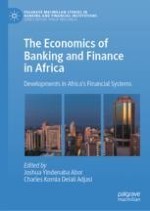2022 | OriginalPaper | Buchkapitel
8. Bank Market Power and Monetary Policy Transmission in Africa in the Wake of Information Sharing Institutional Arrangements
verfasst von : Anthony Adu-Asare Idun, Samuel Kwaku Agyei, Sean J. Gossel, Joshua Yindenaba Abor
Erschienen in: The Economics of Banking and Finance in Africa
Aktivieren Sie unsere intelligente Suche, um passende Fachinhalte oder Patente zu finden.
Wählen Sie Textabschnitte aus um mit Künstlicher Intelligenz passenden Patente zu finden. powered by
Markieren Sie Textabschnitte, um KI-gestützt weitere passende Inhalte zu finden. powered by
